Zanussi washing machine fills with water and immediately drains
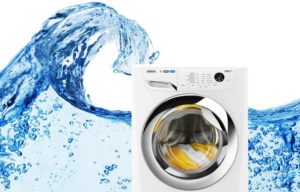 During operation, even the most expensive equipment periodically produces “surprises”: both temporary failures and serious breakdowns. The user’s task is to promptly notice the problem, carry out appropriate diagnostics and fix the problem. So, if the machine fills with water and immediately drains it, then inaction threatens to result in unfinished washing and even a flood. You can’t hesitate, you should immediately respond to an unpleasant “symptom” and carefully check Zanussi for the serviceability of key elements of the system. Let's look at what to watch and how, point by point.
During operation, even the most expensive equipment periodically produces “surprises”: both temporary failures and serious breakdowns. The user’s task is to promptly notice the problem, carry out appropriate diagnostics and fix the problem. So, if the machine fills with water and immediately drains it, then inaction threatens to result in unfinished washing and even a flood. You can’t hesitate, you should immediately respond to an unpleasant “symptom” and carefully check Zanussi for the serviceability of key elements of the system. Let's look at what to watch and how, point by point.
How to explain this “behavior” of technology?
It is very difficult to miss that the Zanussi washing machine immediately empties the tank after washing. Three “symptoms” clearly indicate this. First, the cycle does not complete at the appointed hour. Secondly, the machine does not start washing or spinning - the equipment stands motionless, only the uninterrupted pump hums. Thirdly, wet but dirty clothes are removed from the drum. Several faults may be to blame for this Zanussi behavior:
- improperly installed drain hose;
- clogged sewer pipe;
- malfunction of the drain valve;
- broken pressure switch;
- problems with the control board.
Modern Zanussi washing machines, if there are problems with filling or draining, immediately record the fact of the malfunction, stop the cycle and display the error code that has occurred.
Regardless of the reason, this behavior of the machine cannot be ignored. Uncontrolled drainage and collection of water negatively affects the washing machine: the pump with impeller, control board, hoses and valves will be at risk. There is also danger outside of technology - there is a high probability of leaks, short circuits and floods.
Is the drain connected correctly?
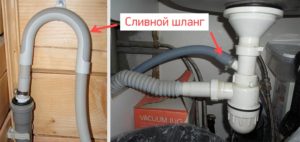 You can solve the problem of uncontrolled drainage with your own hands - you just need to consistently eliminate possible breakdowns. First of all, we pay attention to the drain hose, especially if the machine has just “moved” to a new location. So, more often than not, it is the incorrect installation of the drainage hose that leads to endless pouring of water into the drum.
You can solve the problem of uncontrolled drainage with your own hands - you just need to consistently eliminate possible breakdowns. First of all, we pay attention to the drain hose, especially if the machine has just “moved” to a new location. So, more often than not, it is the incorrect installation of the drainage hose that leads to endless pouring of water into the drum.
According to the instructions, the drain hose should be located above the level of the tank, approximately 50-60 cm from the floor. Each Zanussi washing machine model has its own recommended height - all in order for the “siphon effect” to work. Due to the pressure difference, water does not randomly leave the tank. But if errors were made during installation, the balance will be disrupted and the liquid will pour into the sewer without stopping. The pressure switch will notice the empty drum and give a command to dial again. This cycle can continue forever until the power goes out, a person intervenes, or the pump or circuit board breaks.
The drain hose is installed at a height of at least 50-60 cm from the floor!
There is another way to check the drain hose. All you have to do is turn on the quick wash and stay at the machine for a minute. If the washer fills with water and the pump immediately starts humming, then the problem is definitely due to improper installation.
The position of the hose is adjusted simply and quickly. It is enough to look at the factory instructions for Zanussi, take into account the standards and recommendations given there, and then apply them in practice.Fix a special loop on the back wall and pull the corrugation through it. Afterwards, all that remains is to run a test cycle, checking the quality of the repairs performed.
Dirt accumulation is to blame
Another reason for continuous filling and draining lies in a clogged drainage system. Accumulations of dirt in the pipes, on the impeller, on the filter and volute negatively affect the functioning of the pump - it begins to “freeze” and turn on randomly. The problem is resolved by cleaning clogged elements.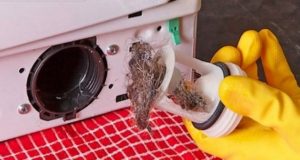
Cleaning begins with the debris filter. To get to the filter nozzle, you must:
- turn off the power to the machine, turn off the water;
- pry open the technical hatch in the lower part of the body with a knife, release the latches and remove the false panel;
- find the garbage filter - the black “washer” on the right;
- place a container under the plug (water will flow out of the hole!);
- grab the protrusion and unscrew the nozzle, working counterclockwise;
- clean the “spiral”, and if necessary, soak in a warm lemon solution;
- use a flashlight to illuminate the filter seat and inspect the drainage system;
- clean the drainage from debris, foreign objects and plaque.
When you unscrew the garbage filter, water will flow out of the machine - be prepared!
Another option is to check the drainage through the bottom. It is enough to turn off the washing machine, move it away from the wall, turn it over on its right side and look inside through the bottom. Most Zanussi machines do not have a pan and the Aquastop system, which will greatly facilitate the diagnostic and repair process.
Sensor that monitors the amount of water
A continuous “whirlpool” may indicate a problem with the pressure switch. This is a sensor that monitors the degree of filling of the drum.As soon as water reaches a certain level, the device sends a signal to the control board to stop filling. But if the device is clogged or broken, the information is recorded incorrectly or is not transmitted to the electronic unit. As a result, there is an overflow, to which the Zanussi security system responds with an emergency drain. The endless flow can only be stopped by the user, power failure or internal failure.
The pressure switch fails for several reasons: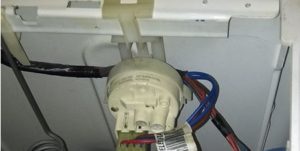
- oxidation or separation of contacts;
- short circuit on the chip;
- violation of membrane tightness;
- clogging, damage to the pressure switch tube.
Failures in the operation of the pressure switch cannot be ignored - this can lead to internal breakdowns and leakage, even leading to a flood. It is better to immediately start diagnosing the sensor. We proceed like this:
- disconnect equipment from communications;
- unscrew the screws on the back panel that secure the top cover;
- push the lid until it clicks, lift it and remove it from the grooves;
- remove the pressure switch;
- inspect the sensor, wash it, clean the contacts.
If there is visible damage, there is no point in repairing the sensor - it is easier to buy a new one. Install the pressure switch yourself in the reverse order. Finally, we start the washing machine and evaluate the behavior of the machine.
Interesting:
Reader comments
- Share your opinion - leave a comment
Categories
Washing machine repair
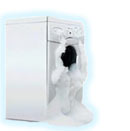

For buyers
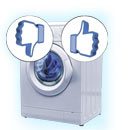
For users

Dishwasher

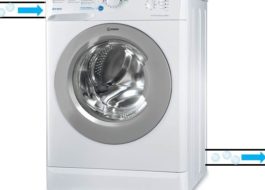
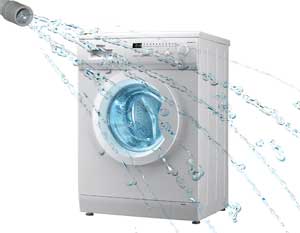

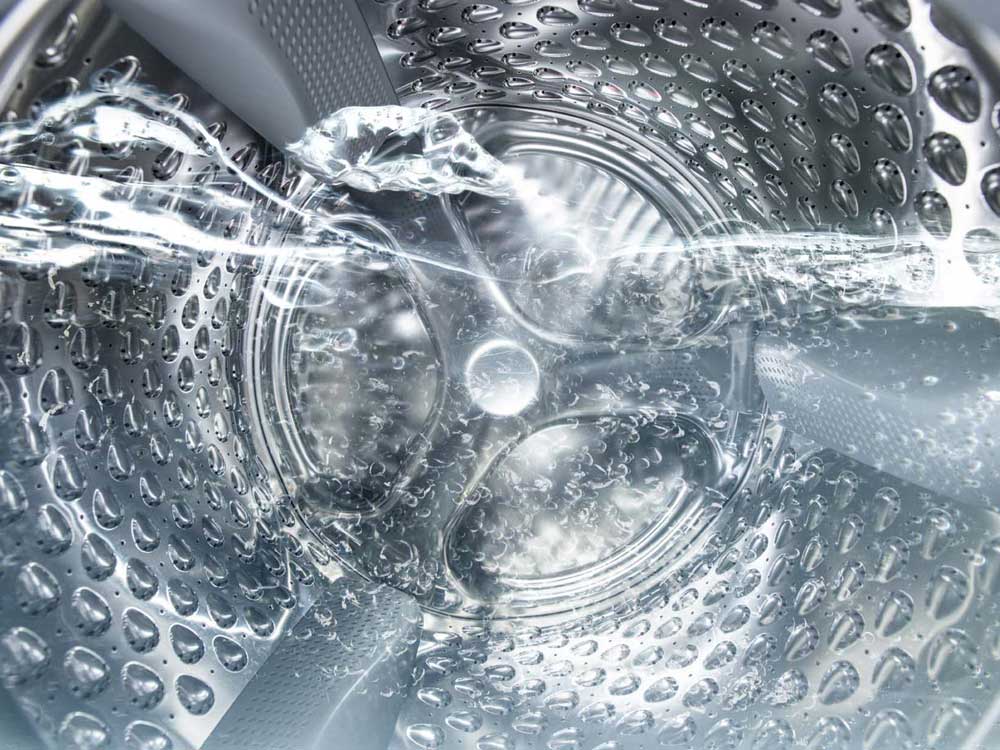
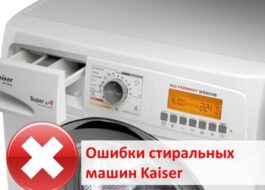

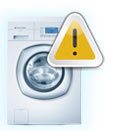
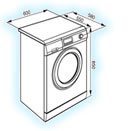
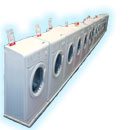
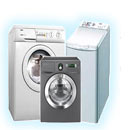


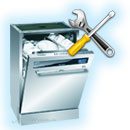
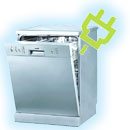

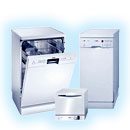
Add a comment